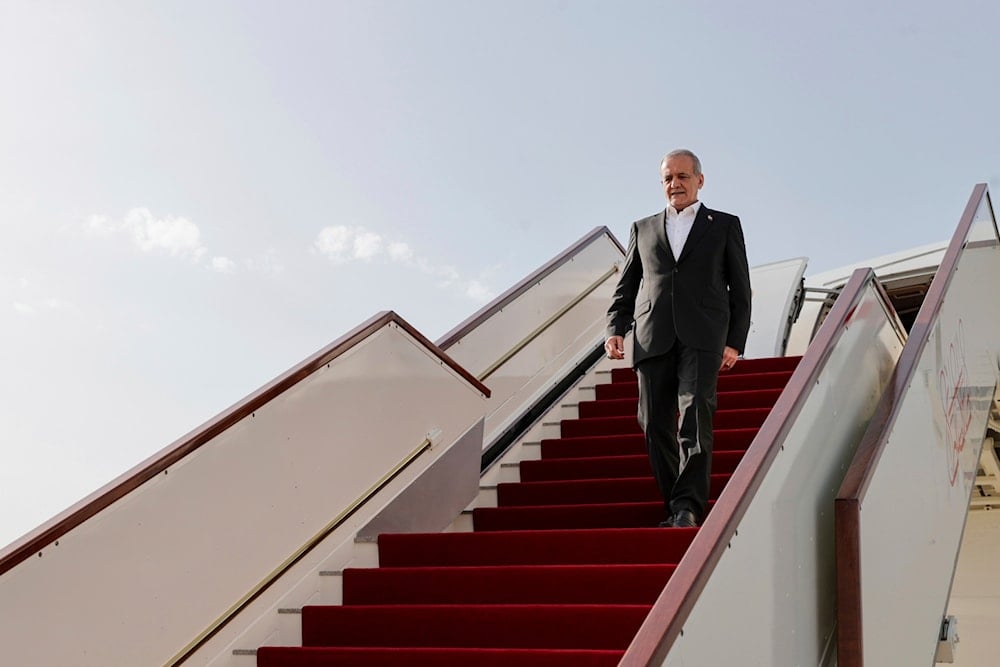Oman to host sixth round of indirect US-Iran nuclear talks Sunday
Oman confirms it will host new US-Iran nuclear talks Sunday amid rising tensions, Trump’s pressure campaign, and Israeli strike warnings.
-

In this photo released by the Iranian Presidency Office, President Masoud Pezeshkian steps out of his plane as he arrives at Muscat, Oman, on May 27, 2025. (Iranian Presidency Office via AP)
Oman will host the sixth round of US‑Iran nuclear talks this Sunday in Muscat, confirmed Foreign Minister Badr Albusaidi. “I am pleased to confirm the 6th round of Iran US talks will be held in Muscat this Sunday the 15th,” he posted on X.
I am pleased to confirm the 6th round of Iran US talks will be held in Muscat this Sunday the 15th.
— Badr Albusaidi - بدر البوسعيدي (@badralbusaidi) June 12, 2025
Meanwhile, Israeli Strategic Affairs Minister Ron Dermer and Mossad Chief David Barnea will take off tomorrow for talks with US special envoy Steve Witkoff ahead of the next round of talks between Tehran and Washington on Iran’s nuclear program, said an Israeli official.
The meeting is designed to “clarify Israel’s position,” said the official.
The Prime Minister’s Office declined to answer where the meeting will take place.
Israeli media reported that Netanyahu decided to send the two senior officials after he and US President Donald Trump spoke at length on Monday about Iran’s nuclear program.
Five rounds so far
Tehran and Washington have held five rounds of talks since April to carve a new nuclear deal to replace the 2015 accord that Trump unilaterally withdrew from during his first term in 2018.
Albusaidi's announcement confirms earlier remarks by Iranian Foreign Ministry spokesperson Esmail Baghaei, who stated that preparations were underway for the next round of talks to be held in Muscat on Sunday.
Diplomacy under pressure as military threats grow
Meanwhile, Iran will present a counter‑proposal to the latest US offer, a proposal it has previously deemed “unacceptable". Tehran says any agreement must guarantee economic relief while preserving its sovereign right to uranium enrichment.
The looming sixth round could either chart a path for renewed sanctions relief or trigger a deeper crisis, especially if Iran severs cooperation with the UN nuclear watchdog amid rising pressures on the country or if Israeli military options gain momentum.
Scrambling US
US President Trump, meanwhile, said yesterday that American personnel were being moved out of what he described as a “dangerous” Middle East. He reiterated his vow to prevent Iran from acquiring nuclear weapons, saying he was now “less confident” about reaching a deal.
On the same day, Iranian Defense Minister Aziz Nasirzadeh said that “all US bases are within our reach” and warned that any attack would be met with strikes on American military installations in the region.
He also revealed that Iran recently tested a missile carrying a two-ton warhead and firmly rejected any external limits on its military capabilities, a move in line with Leader Sayyed Ali Khamenei’s call to strengthen the country’s arsenal.
According to a recent Associated Press report, the US has begun withdrawing non-essential embassy staff and dependents from several Middle Eastern posts, invoking security advisories linked to mounting regional tensions and the uncertain trajectory of the negotiations.
The Pentagon has also issued maritime alerts for Gulf maritime traffic, reflecting escalating concerns tied to Iran‑US tensions in 2025.

 3 Min Read
3 Min Read










